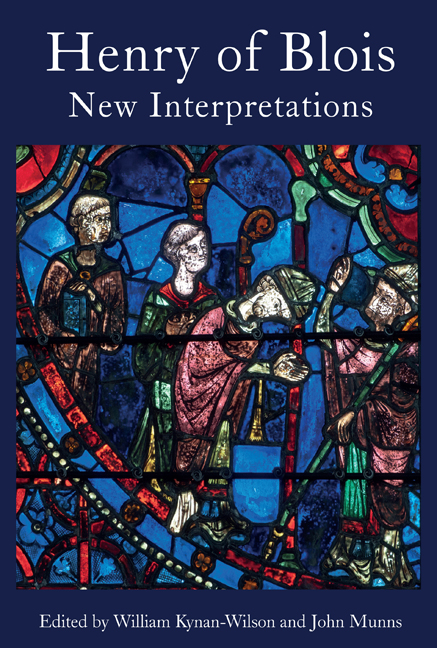Book contents
- Frontmatter
- Dedication
- Contents
- List of Illustrations
- List of Contributors
- Acknowledgements
- List of Abbreviations
- Genealogical Table: The Family Connections of Henry of Blois
- Introduction: Approaches to Henry of Blois
- 1 Causa Dei Et Ecclesie Cluniacensis: Henry of Blois and Cluny
- 2 Henry of Blois and His Legation in England
- 3 The Episcopal Colleagues of Henry of Blois
- 4 The Architectural Heritage of Bishop Henry of Blois at Winchester Cathedral
- 5 Wolvesey: Henry of Blois’ Domus Quasi palatium in Winchester
- 6 Bishop Henry’s Bible
- 7 Henry of Blois and the Construction of Roman Identity
- 8 Henry of Blois: Between Patronage and Representation in the Long Twelfth Century
- 9 The Last Days of Henry of Blois
- Timeline
- Bibliography
- Index
- Plate Section
8 - Henry of Blois: Between Patronage and Representation in the Long Twelfth Century
Published online by Cambridge University Press: 09 February 2021
- Frontmatter
- Dedication
- Contents
- List of Illustrations
- List of Contributors
- Acknowledgements
- List of Abbreviations
- Genealogical Table: The Family Connections of Henry of Blois
- Introduction: Approaches to Henry of Blois
- 1 Causa Dei Et Ecclesie Cluniacensis: Henry of Blois and Cluny
- 2 Henry of Blois and His Legation in England
- 3 The Episcopal Colleagues of Henry of Blois
- 4 The Architectural Heritage of Bishop Henry of Blois at Winchester Cathedral
- 5 Wolvesey: Henry of Blois’ Domus Quasi palatium in Winchester
- 6 Bishop Henry’s Bible
- 7 Henry of Blois and the Construction of Roman Identity
- 8 Henry of Blois: Between Patronage and Representation in the Long Twelfth Century
- 9 The Last Days of Henry of Blois
- Timeline
- Bibliography
- Index
- Plate Section
Summary
During the twelfth century the roles and functions of the episcopal office expanded and diversified, as the responsibilities of bishops increased upon the political stage, and within their diocese and cathedral. Concurrently, following the reform movements of the previous century, a tension was increasingly perceived between a prelate's worldly tasks and his spiritual or pastoral duties. Henry of Blois, who adeptly navigated the Anglo-Norman and Angevin political landscape, and who understood the importance of self-fashioning his public role through patronage and gift-giving, was depicted by contemporary writers in ways that sought to articulate broader arguments about the position of bishops within society, and about episcopal ideals more generally. This is illustrated here through three narratives which show how Henry of Blois was represented and made use of in twelfth-century texts. The first two case studies centre upon saints’ lives: the Life of Robert of Bethune (hereafter VRB), written by William of Wycombe; and Gerald of Wales’ Life of Remigius (hereafter VSR), which features Henry as one of six exemplary bishops. The final case study introduces the Scriptura Henrici abbatis (extant in a late thirteenth-century text), which presents an account of Henry's stewardship of Glastonbury Abbey. Collectively these narratives tell us little about Henry's character, and this perhaps explains why all three texts have tended to be peripheral to previous assessments of Henry of Blois. However, these narratives open up new ways of thinking about Henry's influence on his contemporaries, as well as his literary and institutional legacies.
Much of this chapter explores the ways in which authors (and institutions) used Henry for different purposes and with specific aims and audiences in mind. First, it concentrates on how Henry of Blois was depicted, and what twelfth-century writers and the institutions to which they belonged, or were associated with, prioritised. Second, it questions the emphasis placed in much of the historiography: whether this is David Knowles’ attempts to quantify Henry's moral or intellectual greatness (or lack thereof); or the different ways historians have articulated Henry's ‘dual loyalties’ to the Church and State.
- Type
- Chapter
- Information
- Henry of BloisNew Interpretations, pp. 209 - 231Publisher: Boydell & BrewerPrint publication year: 2021



